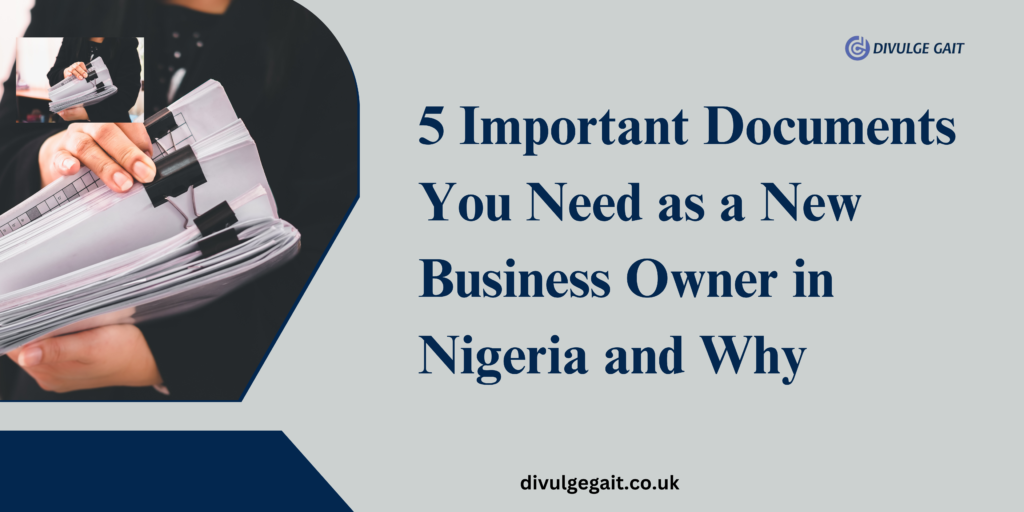Starting a new business in Nigeria is both an exciting and challenging endeavor. While it brings the promise of innovation, growth, and economic contribution, it also requires careful preparation, especially in terms of legal documentation. As a new business owner, having the right documents not only ensures compliance with the law but also sets a solid foundation for success.
In this blog post, we’ll explore the five essential documents every new business owner in Nigeria needs and why they are crucial for your venture.
1. Business Registration Certificate
The first step for any new business owner in Nigeria is to register the business with the Corporate Affairs Commission (CAC). The Business Registration Certificate is a legal document that officially recognizes your business as a legitimate entity in the country.
Why It’s Important
– Legal Recognition: This certificate proves that your business exists legally and can operate within Nigeria.
– Access to Financial Services: Banks and financial institutions require this certificate to open a business account, access loans, or receive other financial services.
– Contracts and Partnerships: Potential partners, suppliers, and clients often require proof of business registration before engaging in any formal agreements.
To register your business, you can visit the Corporate Affairs Commission (CAC) website for more information on the registration process.
2. Tax Identification Number (TIN)
Every business in Nigeria must obtain a Tax Identification Number (TIN) from the Federal Inland Revenue Service (FIRS). The TIN is a unique number assigned to your business for tax purposes.
Why It’s Important
– Compliance with Tax Laws: The TIN ensures that your business is properly registered for tax purposes and compliant with federal tax laws.
– Tax Benefits and Deductions: With a TIN, your business is eligible for various tax benefits and deductions.
– Participation in Public Tenders: Government contracts and public tenders require businesses to have a TIN as proof of tax compliance.
Visit the FIRS website to learn more about obtaining a TIN.
3. Company Memorandum and Articles of Association (MEMART)
The Memorandum and Articles of Association (MEMART) are essential documents that outline the company’s structure, objectives, and governance rules. They serve as a constitution for your business, detailing the rights, duties, and responsibilities of its members and directors.
Why It’s Important
– Clarity in Operations: MEMART defines the scope of your business activities, helping avoid disputes or misunderstandings among stakeholders.
– Legal Protection: Clearly defines roles and responsibilities, providing legal protection to the company and its members.
– Attracting Investors: Potential investors often review the MEMART to understand the company’s governance and operational framework.
4. Operating Permits and Licenses
Depending on the nature of your business, you may need specific permits or licenses to operate legally in Nigeria. These could include health permits, environmental permits, or industry-specific licenses.
Why It’s Important
– Legal Compliance: Operating without the necessary permits or licenses can result in fines, penalties, or even business closure.
– Industry Standards: Permits and licenses ensure your business meets industry standards and regulations.
– Trust and Credibility: Demonstrates to customers and partners that your business operates ethically and legally.
Check with your local government authority or industry association for specific permits required for your business.
5. Employment Contracts and Employee Handbook
If your business plans to hire employees, it is crucial to have clear and comprehensive employment contracts and an employee handbook. These documents outline the terms of employment, including job responsibilities, compensation, and workplace policies.
Why It’s Important
– Legal Protection: Employment contracts protect both the employer and employees by clearly defining roles, responsibilities, and expectations.
– Avoids Disputes: Helps prevent misunderstandings and disputes between employers and employees.
– Promotes a Positive Work Culture: An employee handbook can communicate your company’s values, mission, and workplace culture, promoting a healthy work environment.
To draft effective employment contracts, consult a legal expert or explore resources on the Nigerian Bar Association website.
Securing these essential documents is a critical step for any new business owner in Nigeria. They not only help you stay compliant with the law but also provide a solid foundation for building a successful and sustainable business. Remember, proper documentation is a key part of business planning and risk management, helping you avoid potential legal or financial pitfalls.
If you’re looking for professional assistance in navigating the complexities of starting a business in Nigeria, Divulge Gait is here to help. Our expert consultants provide comprehensive support in business registration, legal compliance, and strategic planning.
Contact us today to schedule a free consultation and take the first step towards building a successful business!


